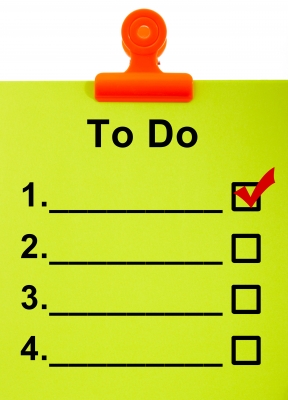 Coping with the pain and turmoil in a life governed by an eating disorder can tempt you into making to do lists. You want positive change in your life. Why not just make a list of what you want to change, and follow your own directions in an orderly manner? A "To Do" list can seem like your solution. Can it work, or is it a set up for failure?
Coping with the pain and turmoil in a life governed by an eating disorder can tempt you into making to do lists. You want positive change in your life. Why not just make a list of what you want to change, and follow your own directions in an orderly manner? A "To Do" list can seem like your solution. Can it work, or is it a set up for failure?
When you suffer from an eating disorder your psyche developed to incorporate your eating disorder behavior and thoughts into what feel natural and normal. Your way of being in the world is integrated with your disorder so that you have no sense of how to function without it. You know that simply deciding to “stop” your eating disorder behaviors doesn’t work. Plus, you know you do things unrelated to food but related to your eating disorder thinking that cause problems in your life.
Your "To Do List" Your list might go something like this:
- Don’t watch TV (or limit TV to 2 hours a week or one or two favorite shows).
- Get eight hours of sleep every night.
- Eat a balanced breakfast every day.
- Call friends (or people who used to be friends) and invite them to a social activity.
- Take a shower or bath every day.
- Get dressed nicely every day.
- Clean the house and get rid of clutter.
- Throw out junk food and binge food.
- Get to an employment agency and go on interviews for a new job.
- Take a class at a college extension program
- Keep promises
- Limit texting, Internet, TV and reading to reasonable amounts.
Most people would agree that these are worthwhile tasks. Versions of this list appear in self-help programs, self-help books, blogs and suggestions from support groups, friends, therapists, and here it is on my blog. It may be pinned up on your bulletin board. A worn and faded version may be floating around in your desk or bureau drawer.
Does the List Work? Usually, no. So the question becomes, why do you revert to old behaviors despite your good intentions?
Why that List Doen't Work
Your behaviors and thinking style that keep quallity people and valuable opportunies away from you serve a psychological purpose. You need to take psychological action as well as the mechanical actions on your list.
Making a mechanical change in your life will bring immediate consequenses of the change, e.g. sleep more and be more alert during the day, don’t watch TV and have more time available for other activities. But these changes are often short term. You go back to your former ways because making a mechanical change does not alter the psychological structure of your inner life.
That structure supports the old status quo that allowed you to bear your life. You need the isolation because you can't bear the feelings that come up when you are more in the hustle bustle of life. When the mechanical structure is tampered with, your psychological and emotional vulnerabilities are not protected.
When Can the To Do List Work?
When does such a “To Do” list work? In effective psychotherapy, you make a small change following such a list. Your emotions rise up. The psychology of your inner self reacts. You feel pain, fear, anger. Perhaps you act out and both feel and actually be “out of control” because the old structure isn’t there to hold you, i.e. keep you “in control”.
The Process
On your journey to health with a knowledgeable and caring psychotherapist who understands the healing system of a person with an eating disorder, your acting out can be held. Your experience can be understood, shared, processed and eventually brought to awareness and integrated into your whole psyche. You need your eating disorder behaviors and thoughts less.
So, your list does and doesn’t work, depending on how you prepare to deal with the inevitable consequences of tampering with the balance of your existing system.
Value in Experimentation
Experimenting with a “To Do” list, can lead you to a genuine recovery path. Often it’s when we do everything we can think of, use everything we have available and still fail to accomplish our goals, that we then reach for something beyond what we know about. That’s when we reach for teachers, schools, therapists, educational programs, creativity and spirituality practices, and healthy body movement experiences to grow beyond our limits.
You may begin with the series introduction here.


Add comment